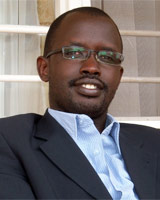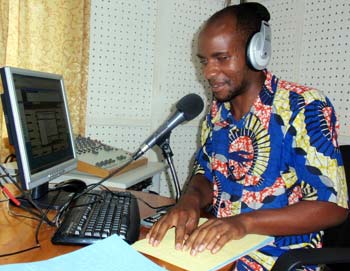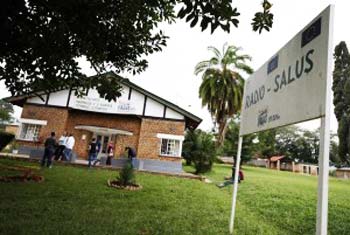UNESCO and media success story: Radio Salus in Rwanda
06-07-2009 (Kigali)

Aldo Havugimana, Managing
Director of Radio Salus.
© UNESCO
Created in 2004 as a result of the collaboration between the National University of Rwanda (NUR) and UNESCO, Radio Salus is one of the first private radio stations to start broadcasting since 1994 genocide. Since its creation, it has received many accolades due to its demonstrated effectiveness and professionalism.
Today, not only has it achieved one of its primary goals of media capacity building, but it has also enhanced and diversified radio programming in the whole country. Moreover, its impact is felt in the neighboring countries as it can be listened to by those living in some parts of Burundi and DRC, and it has became a tool for women empowerment and a voice for the voiceless including people with disabilities.
By the time Radio Salus’ was officially inaugurated in November 2005, 26 students and NUR tutors had completed the first training session organized by UNESCO and funded by the Japanese Government. By November 2008, 102 journalists had received training through Radio Salus; many students continue to work there as trainee journalists. Upon graduation, the received training allows many of these students to have a competitive advantage while seeking employment as journalists. For example, due to their experience at Radio Salus, five graduate trainees have already been employed full time at TV Rwanda.
Nduhura Dominique, Director of NUR School of Journalism and Communication, explains how Radio Salus contributed to NUR students’ experience: “When you meet some second-year students, you can’t believe they’re only in second year because they already know how to report and to deal with news. When they reach their third or fourth year, they are really skilled, mainly because of Salus. So, it is very, very enriching.”
On the top of its impact on NUR students and its overall capacity building goal, another primary objective of the Radio Salus project is to enhance democracy in Rwanda by providing a new outlet for freedom of expression and the free flow of information. Training of students and professionals at the radio station has become a key determinant in diversifying media programming in Rwanda and in building confidence in private radio as a viable means of mass media. Because of its good reputation, Radio Salus is one of the top three most listened radio stations in the country, and it has become a platform where a range of issues are debated.
Equally significant is the fact that Radio Salus is the only independent radio station with permanent correspondents in at least two regions of the country. In addition, the amount of original informational and educational programming the station produces is outstanding, and the variety of programmes is unparalleled in Rwanda: each week more than 25 different programmes are broadcast 24 hours a day, 7 days a week, primarily in Kinyarwanda, but also in Kiswahili, English and French. The Radio Salus programmes include education, agriculture, health, HIV/AIDS, Rwandan history, news, conflict management, sports and coffee. Radio Salus sports programme has been rated the top one in the country.
Radio Salus has also managed to empower Rwandan youth, women and disabled people. Through its educational programmes on economy, environment, HIV/AIDS, health and history, it has become a socio-economic development tool for many Rwandans. For example, Radio Salus has contributed to educating local small businessmen and women on how to advertise their products and services. In addition, it has also supported and promoted young artists by giving them the opportunity to publicise their new songs.
Another very important element about Radio Salus is that it is the only radio station in the country with blind personnel. This has allowed a platform where disabled people feel included and can address issues relevant to their daily life and struggles. Thus, Radio Salus gives a voice to people with disabilities, such as the blind, who usual do not get an opportunity to get their voices heard and are neglected by the rest of the public. By employing a blind person, Radio Salus sends a clear message against discrimination, reminding that everyone in the community should be given equal consideration with no exception.
Radio Salus has become a symbol of a successful community radio that plays an instrumental role in Rwanda in different ways. This success story illustrates the ability of a radio station to transform not only its community, but the country in its whole.
Interview with the first blind radio journalist in Rwanda, Léonidas Ndayisaba (PDF)
Interview with Aldo Havugimana, Managing Director of Radio Salus in Butare, Rwanda (PDF)
By the time Radio Salus’ was officially inaugurated in November 2005, 26 students and NUR tutors had completed the first training session organized by UNESCO and funded by the Japanese Government. By November 2008, 102 journalists had received training through Radio Salus; many students continue to work there as trainee journalists. Upon graduation, the received training allows many of these students to have a competitive advantage while seeking employment as journalists. For example, due to their experience at Radio Salus, five graduate trainees have already been employed full time at TV Rwanda.
Nduhura Dominique, Director of NUR School of Journalism and Communication, explains how Radio Salus contributed to NUR students’ experience: “When you meet some second-year students, you can’t believe they’re only in second year because they already know how to report and to deal with news. When they reach their third or fourth year, they are really skilled, mainly because of Salus. So, it is very, very enriching.”
On the top of its impact on NUR students and its overall capacity building goal, another primary objective of the Radio Salus project is to enhance democracy in Rwanda by providing a new outlet for freedom of expression and the free flow of information. Training of students and professionals at the radio station has become a key determinant in diversifying media programming in Rwanda and in building confidence in private radio as a viable means of mass media. Because of its good reputation, Radio Salus is one of the top three most listened radio stations in the country, and it has become a platform where a range of issues are debated.
Equally significant is the fact that Radio Salus is the only independent radio station with permanent correspondents in at least two regions of the country. In addition, the amount of original informational and educational programming the station produces is outstanding, and the variety of programmes is unparalleled in Rwanda: each week more than 25 different programmes are broadcast 24 hours a day, 7 days a week, primarily in Kinyarwanda, but also in Kiswahili, English and French. The Radio Salus programmes include education, agriculture, health, HIV/AIDS, Rwandan history, news, conflict management, sports and coffee. Radio Salus sports programme has been rated the top one in the country.
Radio Salus has also managed to empower Rwandan youth, women and disabled people. Through its educational programmes on economy, environment, HIV/AIDS, health and history, it has become a socio-economic development tool for many Rwandans. For example, Radio Salus has contributed to educating local small businessmen and women on how to advertise their products and services. In addition, it has also supported and promoted young artists by giving them the opportunity to publicise their new songs.
Another very important element about Radio Salus is that it is the only radio station in the country with blind personnel. This has allowed a platform where disabled people feel included and can address issues relevant to their daily life and struggles. Thus, Radio Salus gives a voice to people with disabilities, such as the blind, who usual do not get an opportunity to get their voices heard and are neglected by the rest of the public. By employing a blind person, Radio Salus sends a clear message against discrimination, reminding that everyone in the community should be given equal consideration with no exception.
Radio Salus has become a symbol of a successful community radio that plays an instrumental role in Rwanda in different ways. This success story illustrates the ability of a radio station to transform not only its community, but the country in its whole.
 Léonidas Ndayisaba, first blind radio journalist in Rwanda.
Léonidas Ndayisaba, first blind radio journalist in Rwanda.© UNESCO
 Radio Salus premises.
Radio Salus premises.© UNESCO
Related themes/countries
· Community Media
· Freedom of Expression
· Rwanda
· Training of Media Professionals
· People with Disabilities and ICT
Share this story:
Contact information
- UNESCO
Source














